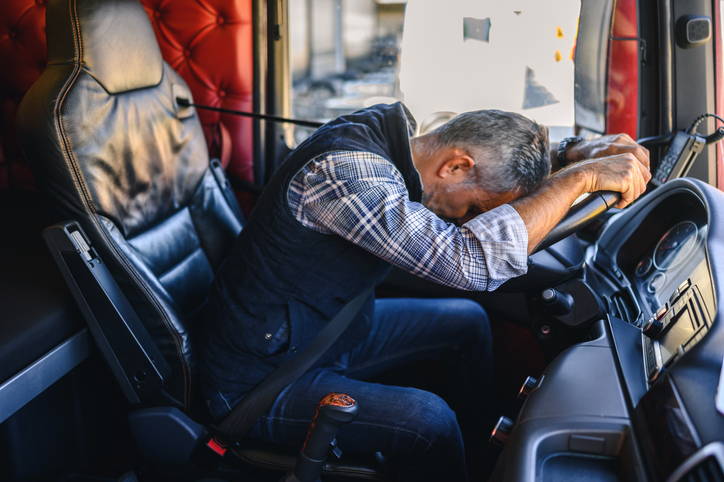
The trucking industry continues to resist mandatory medical screening for obstructive sleep apnea, even though data suggests a significant portion of commercial drivers suffer from the fatigue-inducing condition.
Truckers With Untreated Sleep Apnea Have Higher Crash Rate
Obstructive sleep apnea causes interruptions in breathing of up to 10 seconds during sleep. Untreated, the condition can lead to a host of issues, including high blood pressure, heart disease, memory lapses, and drowsy driving.
About 22 million Americans have moderate-to-severe obstructive sleep apnea, with roughly 80% of cases going undiagnosed. The best estimates suggest that 28% — nearly a third – of the nation’s non-farm commercial drivers suffer from the disorder.
A little over three years ago, researchers at Harvard, the University of Minnesota, and Brigham & Women’s Hospital reported that truckers with untreated sleep apnea had a preventable crash rate five times higher than their counterparts without the ailment. They urged regulators to consider mandatory sleep apnea screening, diagnostic testing, and treatment adherence monitoring to reduce fatalities associated with large truck crashes and other commercial vehicle accidents.
Trump Administration Abandoned Sleep Apnea Screening Rule
Truck drivers undergo yearly medical exams to maintain their commercial license, and its up to the doctor to determine if a trucker requires sleep apnea screening. While the Obama administration did propose a mandatory screening rule in 2016, its implementation was abandoned shortly after President Trump took office.
Some commercial trucking companies do require sleep apnea screening for new hires, and a few will even pay for treatment. But the industry, as a whole, is vehemently opposed to any type of federally imposed screening requirement.
The Owner-Operator Independent Drivers Association, for example, insists its own research shows no link between sleep apnea and increased truck crashes. The group is also concerned that the cost of such a program – estimated between $740 million and $12.8 billion – will be borne by drivers, especially independent contractors who can’t count on an employer to shoulder the financial burden.
Trucking Industry a Trump Administration Ally
The Trump administration sees the commercial trucking industry as an important ally, so there’s little chance that mandatory sleep apnea screening will become a reality in the near future. In fact, President Trump’s willingness to champion the industry’s interests could actually allow even more fatigued and overworked truck drivers to take to the road.
That’s because the U.S. Federal Motor Carrier Safety Administration (FMCSA) is preparing to weaken the Hours of Service Rules, a set of existing regulations that help prevent fatigue-related accidents by limiting the number of daily and weekly hours interstate commercial drivers can work or operate their vehicle. The rules also specify the minimum amount of time drivers must rest between driving shifts.
New Hours-of-Service Rules Could Reflect Industry’s Wish List
The trucking industry has sought to weaken the Hours of Service rules for decades. The FMSCA expects to debut the new regulations by the end of this month, and industry insiders appear fairly optimistic that the final proposal will reflect their wish list.
“First of all, this administration is not as aggressive as the prior,” Bill Sullivan, the top lobbyist for the American Trucking Associations, recently told the Associated Press. “Most importantly, the partnership with them has not been as suspicious of industry as in the past.”
Contact Our Undefeated Truck Accident Lawyers for a Free Consult at 1-888-603-3636 or by CLICKING HERE
Our Undefeated Truck Accident Lawyers have won billions for thousands of accident victims in Texas, Louisiana, and across the United States, including Record-Setting Verdicts and Settlements in cases involving undiagnosed, obstructive sleep apnea and driver fatigue.
Call 1-888-603-3636 or Click Here to send us a confidential email via our “Contact Us” form.
All consultations are free and, because we only work on a contingency-fee basis, you’ll owe nothing unless we win your case.